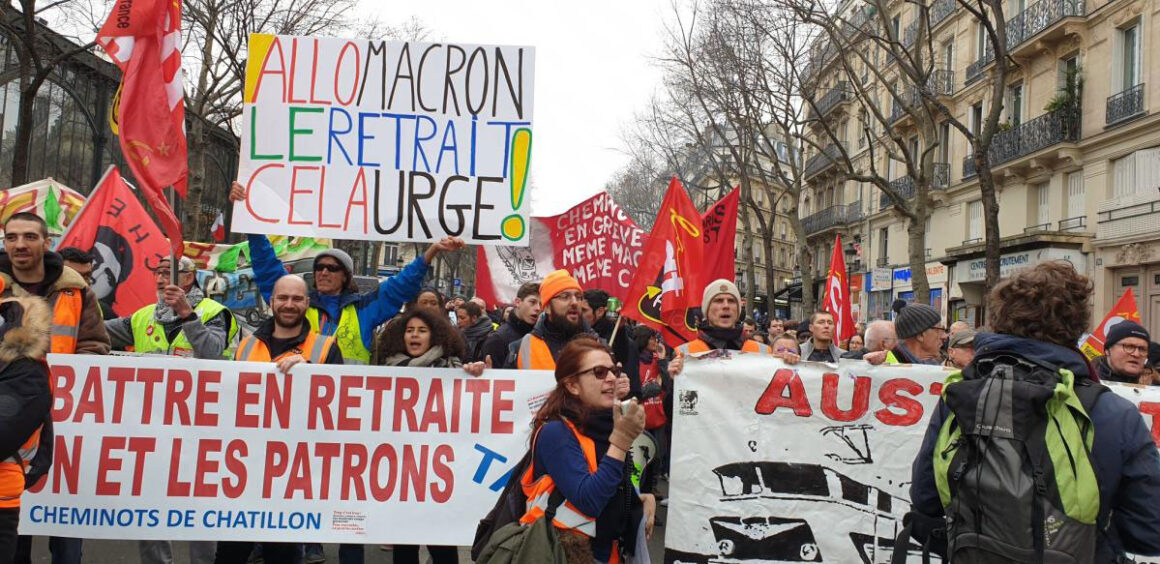

By Marc Lassalle—PARIS
FOR TWO months France has been convulsed by strikes and protests against President Emmanuel Macron’s attempt to raise the retirement age from 62 to 64, a measure that will affect all employees but especially manual workers and women, and is rejected by a large majority of the population according to opinion polls.
After nine days of strikes, massive demonstrations and months of trying to buy the votes of the right wing Republicans in the National Assembly, the government still could not obtain a majority. So the president resorted to rule by decree to impose the change without a parliamentary vote.
This catapulted the crisis into a new political stage. The issue is now Macron’s survival as the undemocratic nature of the Fifth Republic, embodied in the authoritarian powers of the presidency, are being called into question.
Resistance and repression
On 23 March 3.5 million demonstrators filled the streets of France. With 800,000 in Paris, 250,000 in Marseille, 110,000 in Bordeaux, 55,000 in Lyon, 50,000 in Clermont-Ferrand, many are record turnouts.
Indefinite strikes continue at four of the country’s seven major oil refineries and a fifteen-day strike by bin workers in Paris led to large piles of rubbish choking the capital. One placard read ‘Jupiter, the people will bring you back down to Earth’, referring to the nickname Macron’s lofty manner has earned him.
Interior Minister Gérald Darmanin deployed 12,000 police, including 5,000 in Paris. The CRS, France’s violent riot police, launched teargas canisters and batons, while young demonstrators reacted by setting fire to piles of rubbish and cars. In addition, a special anti-protest motorcycle unit, armed with handguns, batons and teargas grenades, has been recorded on video and audio beating, intimidating and threatening people.
Another national mobilisation is due on 28 March but smaller, localised demonstrations have continued on a nightly basis. Macron poured petrol on the fires when he accused protesters of being the same as the Trump supporters who stormed the US Capitol and of seeking to overthrow democracy, petulantly declaring: ‘I will not tolerate any misbehaviour’.
But it was Macron who overturned democracy when he triggered article 49.3 of the Constitution, which allows him to overrule parliament and pass laws without the support of a majority of MPs, let alone a popular mandate. This outrageous trampling of democracy provoked a fresh series of nightly protests for more than a week. Increasingly, young people are to the forefront in these battles with the security forces; they will not be robbed of their democratic rights!
In the workplaces the tempo of the struggle is still uneven, although parts of the railways, energy supply, docks and refuse collection have been on strike for weeks. The ports at Marseille and Rouen are blockaded, along with several refineries. Petrol shortages are severe in the south and creeping inexorably across the country.
All the trade union federations declared they would bring the country to a standstill in March. The reality, however, is somewhat different. While some well-organised sectors are conducting ‘renewable strikes’ (voted at daily workplace assemblies each morning), there is no generalised strike. Millions are brought onto the streets for the days of action, but the number of strikers outside those days is rather low.
What is going on? The trade union leaders have staked their credibility on this battle—they cannot concede defeat today. Since the pension reform is widely and correctly seen as stealing two years’ retirement, defeat would be mean admitting they lack the power to defend workers’ existing conditions of life and work, never mind fight for improvements.
Despite the stakes the unions are resisting the call for a general strike, increasingly heard on the streets. The reason is simple. The number of unionised workers in France is low, less than one in 10. The leaders therefore prefer to combine strikes in well-organised strategic sectors, in combination with ‘days of action’ for everybody else.
General strike
Now that Macron has thrown down the gauntlet of his presidential authority, the struggle requires political action on an equivalent scale. For the union bureaucracy a general strike would mean the organisation of local, regional and national leaderships to coordinate it. So the leaders equivocate and throw the responsibility back to the renewable strikes, voted by workplace general assemblies of strikers. Of course most workers still view the union leaders as their trusted leadership, in part because the trade union front (the intersyndicale) remains united and the leaders’ speeches have a radical tone.
Nevertheless, limiting things to one-day strikes, even weekly ones, is a strategy for defeat.
The call on the leaders for a general strike should grow ever louder as must efforts to bring it about at workplace and local level. Coordinations of delegates from the different unions, which have existed in previous major movements, need to be created today. They will need to link up with the students in the lycées (high schools) and universities. In Paris and Toulouse are students have already occupied their buildings, an example to be followed nationally.
Coordinations must grow into real councils of action and take charge of a general strike, not just to force the repeal of the Macron’s pension decree but to kick him and his government out altogether. As Marceau Pivert said, faced with the great wave of factory occupations of 1936, ‘Tout est possible’—everything is possible. But for this the problem of strategy and leadership will have to be solved.